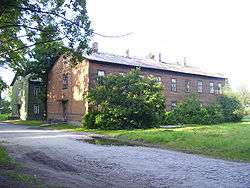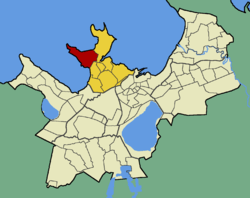Kopli
Kopli (Estonian for "Paddock") is a subdistrict of the district of Põhja-Tallinn (Northern Tallinn) in Tallinn, the capital of Estonia. It is located on the Kopli Peninsula and is bordered by parts of the Tallinn Bay, the Kopli Bay to the southwest and the Paljassaare Bay to the north. Kopli has a population of 7,240 (As of 1 January 2015).[1] Kopli's former German name until 1918 was Ziegelskoppel.
Kopli | |
|---|---|
Subdistrict of Tallinn | |
 Wooden workers' barracks from the 1910s. | |
 Kopli within Põhja-Tallinn. | |
| Country | |
| County | |
| City | |
| District | |
| Population (01.01.2015[1]) | |
| • Total | 7,240 |
Kopli cemetery
Kopli was the former location of the largest Lutheran Baltic German cemetery in Tallinn, known as Kopli cemetery (in Estonian: Kopli kalmistu; in German: Friedhof von Ziegelskoppel) which was founded around 1774. The cemetery was flattened and destroyed over a 170 years later around 1950–1951, during the second occupation of the Baltic states, by the Soviet authorities who used the area of Kopli as a base for the Soviet Armed Forces. The former cemetery is now a public park.
Landmarks and institutions
- Estonian Maritime Academy (Kopli 101)
- Bekker Port (Kopliranna 49)
- Baltic Ship Repair Yard (Kopli 103)
Gallery
 Estonian Maritime Academy (formerly the main building of Tallinn University of Technology, 1932–1964).
Estonian Maritime Academy (formerly the main building of Tallinn University of Technology, 1932–1964). A tram depot in the end of Kopli.
A tram depot in the end of Kopli.- Bekker Port in Kopli seen from the Stroomi Beach in Pelguranna.
- Old wooden houses
- Newer 5-storey apartment building (khrushchyovka)
- Streetview in winter
References
- "Statistical Yearbook of Tallinn 2015". Tallinn City Government. p. 38. Archived from the original on 19 November 2015. Retrieved 25 October 2015.
External links
| Wikimedia Commons has media related to Kopli. |
